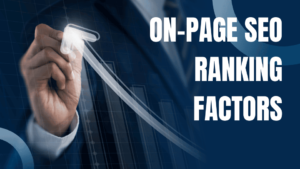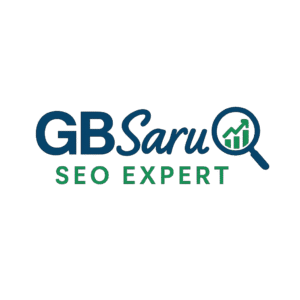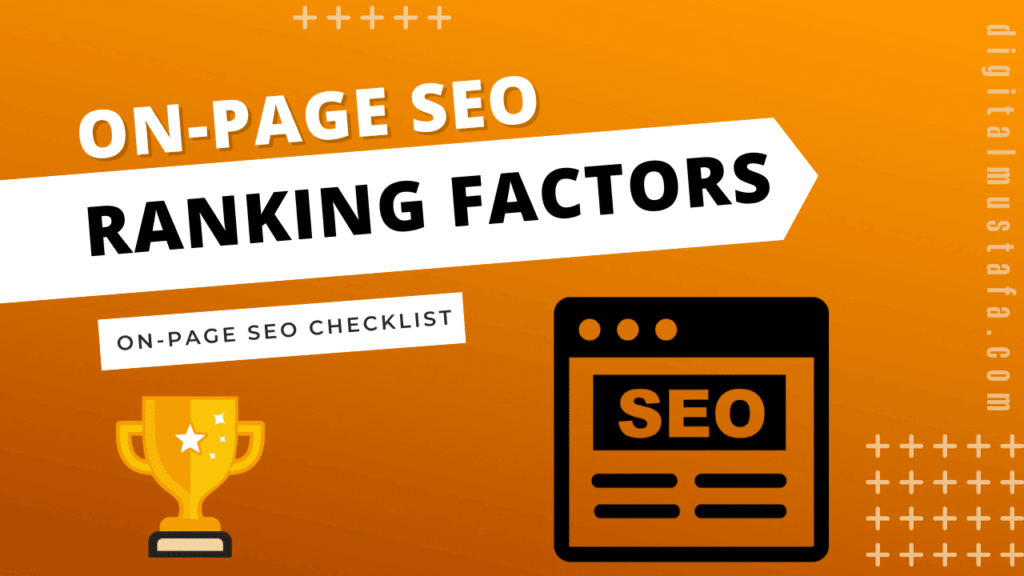On-Page SEO Ranking Factors (Ranked by Importance)

On-page SEO is essential if you want your website to rank higher on Google. It helps search engines understand your content and improves user experience. Below are the most important on-page SEO factors, ranked by their impact on rankings.
1. High-Quality Content (Most Important!)
- Content is the foundation of SEO. Google prioritizes pages that provide useful, well-written, and relevant information.
Creating high-quality content not only attracts readers but also helps you unlock the top benefits of SEO for your website.
✔ Answer users’ questions clearly
✔ Make the content easy to read (use short paragraphs, and bullet points)
✔ Avoid duplicate or copied content
✔ Use keywords naturally without stuffing
Example:
Instead of: “On-page SEO is important because on-page SEO helps with rankings.”
Write: “On-page SEO improves rankings by optimizing content and structure.”
2. Title Tag (Your Page’s Headline)
- The title tag is the first thing users see in search results. A strong title encourages more clicks and improves rankings.
✔ Keep it under 60 characters
✔ Include your main keyword
✔ Make it engaging
Example:
Bad: “SEO Tips – Read Now”
Good: “10 Powerful SEO Tips to Boost Your Google Rankings”
3. URL Structure (Web Address Format)
- A clean, simple URL helps search engines and users understand your page.
✔ Keep it short and descriptive
✔ Use hyphens (-) instead of underscores (_)
✔ Include keywords when possible
Example:
Bad: www.example.com/page?id=123
Good: www.example.com/on-page-seo-tips
4. Meta Description (Short Summary for Google)
- A meta description is a brief summary of your page that appears in search results. It doesn’t directly impact rankings, but a good one increases clicks.
✔ Keep it under 160 characters
✔ Make it engaging and clear
✔ Use your main keyword
Example:
“Learn the most important on-page SEO ranking factors to improve your website’s visibility on Google.”
5. Header Tags (H1, H2, H3, etc.)
- Headers structure your content, making it easier to read. Search engines also use them to understand your page.
✔ H1 for the main title (only one per page)
✔ H2, H3, H4 for subheadings
✔ Include keywords naturally
Example:
H1: What is On-Page SEO?
H2: Top On-Page SEO Factors
H3: Why Keywords Matter in SEO
6. Keyword Placement (Where to Use Keywords)
- Using keywords in the right places helps your page rank. But don’t overdo it!
✔ Title tag
✔ First 100 words of content
✔ Headers (H1, H2)
✔ Image alt text
❌ Avoid: Repeating keywords too much (Google might penalize your page).
7. Internal Linking (Connecting Your Pages)
- Linking to other relevant pages on your website helps search engines and users navigate your content.
✔ Use descriptive anchor text (not just “click here”)
✔ Link to important pages
✔ Helps reduce bounce rate and keeps visitors engaged
Example:
Instead of “Click here to learn more,” write “Check out our on-page SEO guide.”
Want to learn more about the work of SEO experts? Click here to explore what happens behind the scenes.
8. Image Optimization (For Speed & SEO)
- Images enhance content, but they must be optimized for SEO and speed.
✔ Compress images to reduce file size (faster loading)
✔ Use descriptive file names (seo-tips.jpg instead of image1.jpg)
✔ Add alt text (helps search engines and visually impaired users)
Example Alt Text:
“Screenshot showing the top on-page SEO ranking factors in a list format.”
9. Mobile-Friendliness (Google’s Mobile-First Indexing)
- Since most users browse on phones, Google ranks mobile-friendly websites higher.
✔ Use a responsive design (fits all screen sizes)
✔ Ensure text is readable without zooming
✔ Buttons and links should be easy to click
Tip: Use Google’s Mobile-Friendly Test to check your site!
10. Page Speed (Fast Websites Rank Higher!)
- A slow website leads to higher bounce rates and lower rankings.
✔ Compress images and videos
✔ Minimize CSS, JavaScript, and plugins
✔ Use fast web hosting and enable caching
Tip: Check your speed using Google Page Speed Insights.
11. Outbound Links (Linking to Other Websites)
- Outbound links (links to other sites) show Google that your page is credible and well-researched.
✔ Link to trusted sources (e.g., Wikipedia, news websites)
✔ Open links in a new tab
✔ Use relevant links (not just random websites)
Example:
“According to Google’s SEO Guide, content quality is the most important ranking factor.”
12. Schema Markup (Helps Google Understand Your Page)
- Schema markup helps search engines understand your content and show rich snippets (like ratings, FAQs, and product info) in search results.
✔ Article Schema for blog posts
✔ FAQ Schema for frequently asked questions
✔ Product Schema for online stores
Example:
A product with Schema markup can show star ratings and price directly in search results.
Final Thoughts
On-page SEO is one of the most important parts of ranking on Google. By focusing on these top-ranking factors, your website can attract more visitors and improve its search visibility.
Most Important Factors to Focus On:
- 🔹 High-Quality Content
🔹 Optimized Title Tags & URLs
🔹 Meta Descriptions & Header Tags
🔹 Proper Keyword Placement & Internal Linking
🔹 Fast Loading & Mobile-Friendliness SEO is an essential part of online visibility. To learn more about the basics, check out What is SEO.”
Start improving your on-page SEO today, and watch your rankings grow!

